RESEARCH
Dr. Xu’s research is on the interaction of computer systems and applications. It studies systems support for emergent applications, and AI applications in particular, and investigates novel ways of design and implementation of applications enabled by latest advance of systems.
- On one hand, investigate, establish, and experimentally evaluate new system artifacts to improve the systems performance, availability, security, and energy efficiency. Recent work focused on resource management in cloud infrastructure and edge-cloud frameworks for large foundation models and AI applications. See cloud-edge system support for AI for representative work in this domain.
- On the other hand, look into AI models and their applications in intelligent transportation, autonomous driving, and mobility services. Recent emphasis is on reinforcement, federated, and transfer learning and multi-agent algorithms, and on learning algorithms for autonomous vehicles. See AI-overview for overview of representative work in AI fundamentals.
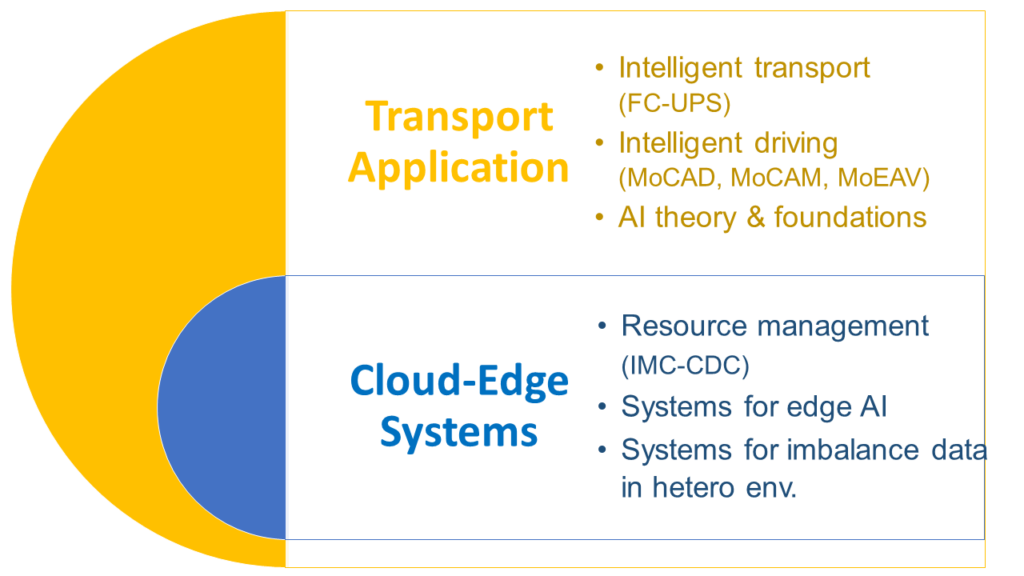
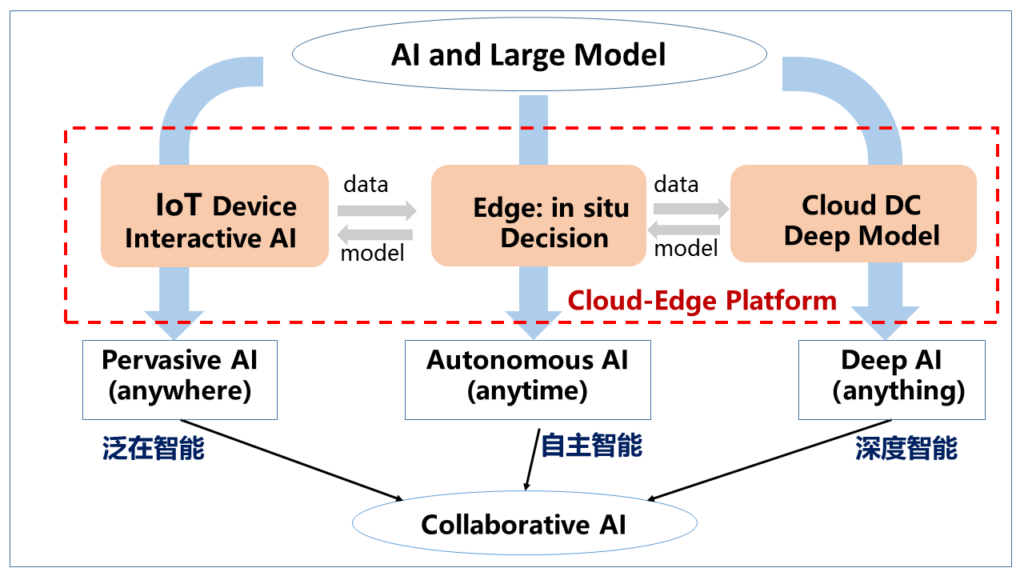
Current Key Projects that Dr. Xu serves as PI (click project titles for details)
 城市交通感知融合与智能推演技术及应用, 获广东省技术发明二等奖. We summarized the achievements on Data Intelligence for Urban Transportation. Also presented a report about MOST’s project on Knowledge Fusion and Cognition for Urban Public Services.
城市交通感知融合与智能推演技术及应用, 获广东省技术发明二等奖. We summarized the achievements on Data Intelligence for Urban Transportation. Also presented a report about MOST’s project on Knowledge Fusion and Cognition for Urban Public Services. Presented a final report about GD key project on Intelligent Management and Control in Cloud Datacenter.
Presented a final report about GD key project on Intelligent Management and Control in Cloud Datacenter. Recently gave talks on Effective Computing for AI to SIGCOMM China’2023, CCF HPC China’2023, and Alibaba Tech. The slides cover part of the results about cloud and cloud-edge infrastructures for AI applications.
Recently gave talks on Effective Computing for AI to SIGCOMM China’2023, CCF HPC China’2023, and Alibaba Tech. The slides cover part of the results about cloud and cloud-edge infrastructures for AI applications. Presented keynote speech on Connected Autonomous Driving, which summarizes the research results in MoCAD project.
Presented keynote speech on Connected Autonomous Driving, which summarizes the research results in MoCAD project.
科技部,面向城市公共服务的高效融合与动态认知技术和平台
- Principal Investigator: Chengzhong Xu, University of Macau
- Funded by Key Program on Smart City, Ministry of Science and Technology under grant 2019YFB2102100, China
- Period: Dec 2019 to Nov 2022
- Amount: 20 million RMB
Small and medium-sized cities accounts for more than 90% of the total number of cities in China. They are the main battlefields of novel urbanization and smart city construction. S&M cities generally have problems such as backward information infrastructure, large differences in service demand, and low resources for IT infrastructure, which limit the deployment and application of traditional smart city systems and technologies. Their smart city construction faces challenging problems: (1) sparsity and bias of perceived data, (2) diverse and complex cognitive scenarios, (3) and limited and inefficient system resources. To copy with the problems, this project systematically studies the whole process of smart city technologies from data perception, knowledge fusion, dynamic cognition, to computing. It is expected to form a set of theoretical methods and technical tools, and build up an open city brain platform of high performance, low energy consumption, and low management cost. The systems and tools will be demonstrated in a number of S&M cities.
Please refer to Data Intelligence for Smart City for final report about the project.
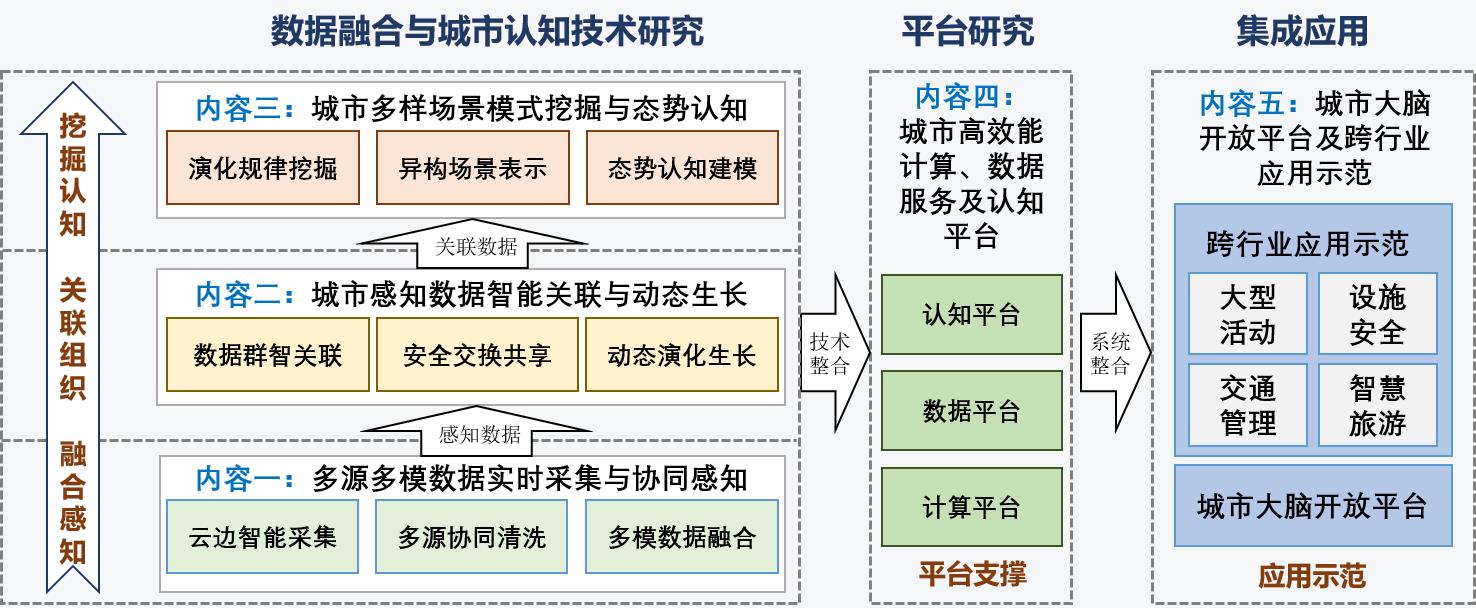
Cooperation Partners:
- 阿裡雲, 澳門大學, 北京航空航天大学,華南理工大學, 中科院深圳先進技術研究院, 浙江之江實驗室, 杭州電子大學, 高德地圖, 中國城市規劃設計研究院, 中景恒基
- Principal Investigator: Chengzhong Xu, University of Macau
- Funded by FDCT under grant 0015/2019/AKP, the Foundation of Science and Technology, Macao SAR
- Period: Jan 2020 to Jan 2023
- Amount: 12 million
Autonomous driving has become an emerging disruptive technology with big impact on our life, economy, and society. This project aims to deal with challenging issues in autonomous driving by utilizing technologies like AI, big data, smart sensing, vehicular networks, and cooperative intelligence. Focus is on the issues due to open and uncertain driving environments and large scale hybrid scenarios with human-driving and self-driving coexistence. Objective is to build a first-class vehicle-infrastructure integrated, cooperative intelligent self-driving test bed in Macau and greater bay area of China and a powerhouse for learning and practice of emerging autonomous driving technologies.
See HERE for recent reports, and THERE for representative work. For more info, MoCAD about the project.
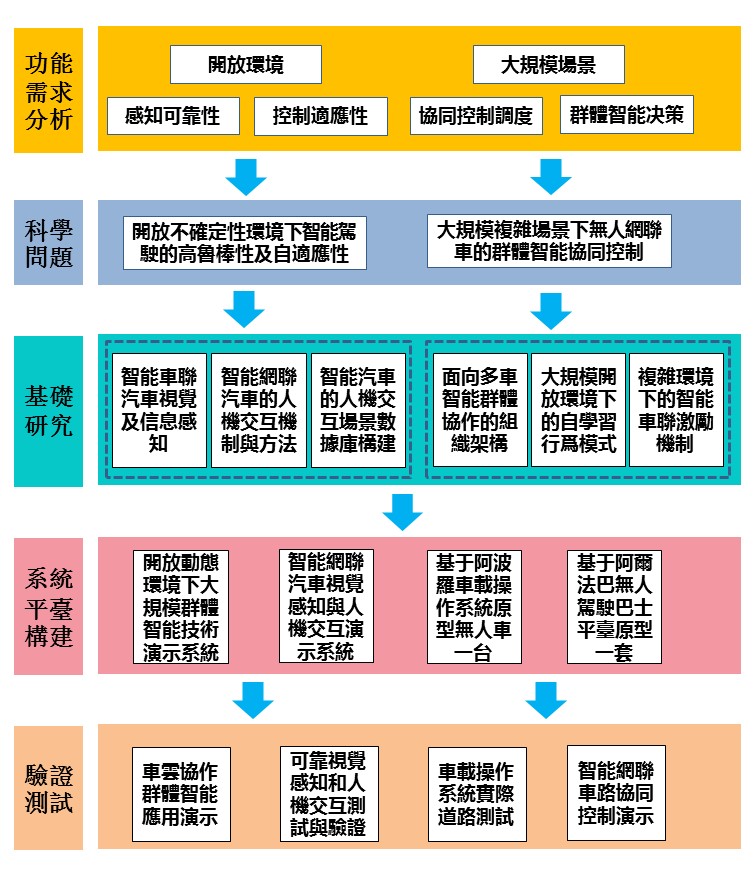
Cooperation Partners:
- 澳門大學, 中科院深圳先進技術研究院, 國防科技大學, 百度, 深圳海梁科技
- Principal Investigator: Chengzhong Xu, University of Macau
- Funded by the Key Area R&D Program of Guangdong Province under grant 2020B010164003
- Period: Jan 2020 to Dec 2022
- Amount: 20 million RMB
Cloud computing, as a driving force of next generation of IT, plays increasingly important roles in economy and society. Its underlying datacenters have been a national key infrastructure, which largely determine the competitiveness of digital economy. Current cloud datacenters need to deal with three fundamental issues: ultra large system scale with hundreds of thousands of servers, heterogeneous resource configuration due to iterative upgrade of software and hardware, and open application scenarios with various types and characteristics. Cloud computing businesses like Alibaba faces more challenges in the provisioning of micro-second response time in highly concurrent application scenarios. This project aims to explore the opportunity of software-defined datacenter architecture and develop intelligent management and control systems for cloud datacenters by a full stack design from underlying architectures to applications. It endeavors to resolve the conflicts between cloud user experience and datacenter resource utilization with a pilot demonstration in Alibaba Cloud.
Please see Cloud Datacenter for details about the project outputs.
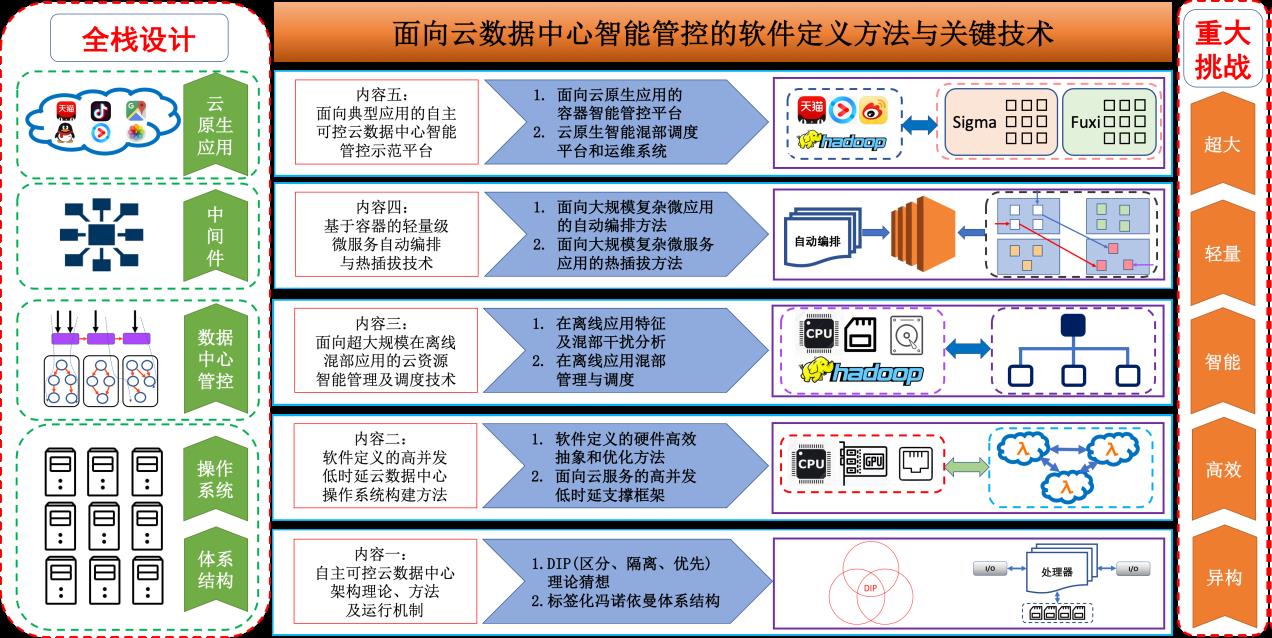
Cooperative Partners
- Shenzhen Institutes of Advanced Technology of CAS, University of Macau, Shanghai Jiaotong Univ., Institute of Computing Technology of CAS, Nanjing Univ., Beijing Univ., Sun Yat-sen Univ., South China Univ. of Technology, Alibaba Cloud
Shenzhen Key Lab of Location-based Technology and Services
- Principal Investigator: Chengzhong Xu
- Funded by Development and Reform Commission of Shenzhen
- Period: 2012-2021 (two phases)
- Amount: 10 million
项目以位置服务为主线,云计算为手段, 针对各种类型和不同形态的海量城市信息, 实现以实体同一性、完整性、时效性和精准性为目标的多源多模数据融合和深度分析挖掘。在信息安全和隐私保护,可信计算、情景计算和数据可视化呈现等方面进行技术攻关。建设一体化位置云服务平台,实现基于位置信息的应用系统接入和管理(2012)。
北斗位置云核心平台的架构如下图所示,主要包括了物理资源层、系统层、支撑层、公共运营与公共事务管理平台四个部分。其中物理资源层主要包括计算、网络以及存储等各类设备,为上层的平台提供相应的资源支撑;系统层则提供了IaaS类服务,对应北斗位置云资源管理系统。通过虚拟化计算资源管理与存储管理,以及相应的策略调度为上层应用提供高效节能、安全可靠的计算与存储服务;支撑层即是云计算技术中常见的PaaS服务,对应北斗位置云应用支撑系统,为应用层提供各种共性技术支撑模块,包括数据交换、存储、计算以及位置服务等相关的应用开发接口。公共运营与公共事务管理平台对应北斗应用运营系统,是基于支撑层开发的各种行业应用,如城市管理、物流服务、智能交通和车辆管理等。这些行业应用都是基于支撑层的相关模块接口以及位置服务接口进行开发和部署的,保证了这些行业应用在北斗位置云平台的顺利部署和运营。有关项目进展,详见 北斗实验室二期报告
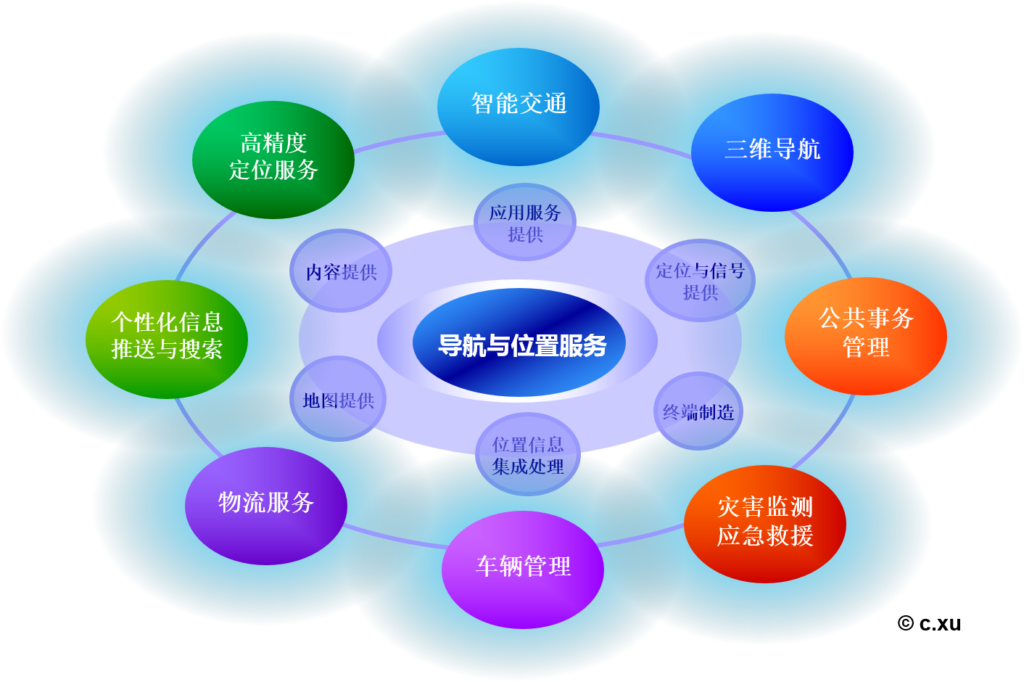
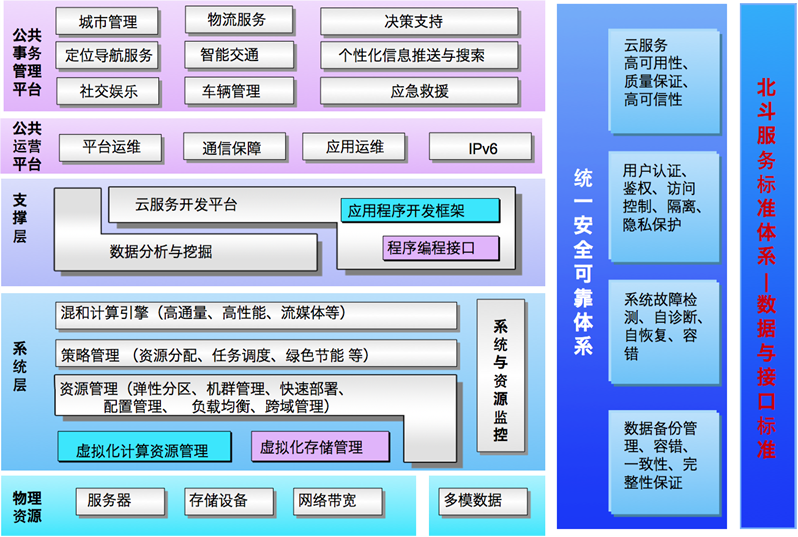
- Principal Investigators: Chengzhong Xu/Kejiang Ye
- Funded by Alibaba Cloud (for public cloud ) and Huawei (for private cloud)
- Period: 2018-2023, Alibaba Innovative Research (AIR) for 5 consecutive phases
This AIR project aims to improve system utilization without compromising user-experienced quality of services. In particular, it is intended to develop technologies to meet the throughput requirements during the heavy shopping day of “Double 11”, without investing additional server resources.
Since 2022, a new project has been launched to work with Huawei to develop technologies to help improve Huawei Cloud utilization.
Past results were summarized in recent talks to SIGComm China’2023, CCF HPC China’2023, and Alibaba Tech on Effective Computing for AI .
This interplay topic has been studied since early projects which Dr. Xu led as PI.
Note that containers bear a resemblance to VMs from the perspective of orchestration. ML has been applied for orchestration of VMs. For example, early efforts in the use of reinforcement learning algorithms for auto-configuration of VMs can be seen in [1-7]. Xu et al. reported their experience with model-free and model-based RL policies, and with various strategies for state space definitions and reward functions. Their work could be applied for container orchestration, as well. Additional factors like fine granularity, flexibility, startup cost, and implications on microservices need to be considered.
- VCONF: a reinforcement learning approach to virtual machines auto-configuration. ICAC 2009: 137-146
- A Reinforcement Learning Approach to Online Web Systems Auto-configuration. ICDCS 2009: 2-11
- CoTuner: a framework for coordinated auto-configuration of virtualized resources and appliances. ICAC 2010: 75-76
- A Distributed Self-Learning Approach for Elastic Provisioning of Virtualized Cloud Resources. MASCOTS 2011: 45-54
- A Model-free Learning Approach for Coordinated Configuration of Virtual Machines and Appliances. MASCOTS 2011: 12-21
- URL: A unified reinforcement learning approach for autonomic cloud management. J. Parallel Distributed Comput. 72(2): 95-105 (2012)
- Coordinated Self-Configuration of Virtual Machines and Appliances Using a Model-Free Learning Approach. IEEE Trans. Parallel Distributed Syst. 24(4): 681-690 (2013)
Recently Completed Projects which Dr. Xu served as PI (contact Dr. Xu for details)
1. Cloud Computing and Systems:
- 国家发改委,云计算检验检测与应用标准化公共技术服务平台 (National D&R Commission, Cloud Verification and Validation Technologies and Standard Public Services), 2011-2015, 48M
- 国自然基金,移动云服务中的隐私保护与安全保障机制研究 (NSFC, Data security and privacy in mobile cloud services), 2014—2017, 2.4M
- 广东省科技厅,广东省云计算信息安全工程实验室 (Guangdong Engineering Laboratory for Cloud Security), 2014—2017
- NSFC, 云系统资源管理中的多目标优化 (海外杰青 B) (2010-2013)
- NSF CCF-1016966, FEMA: Failure Event Modeling and Analysis for Proactive Management in Highly Dependable Systems, (2010-2013) (ML for proactive failure management in clouds)
- NSF CNS-0914330, URL: Unified reinforcement learning for autonomic cloud management (2009-2012) (Reinforcement learning for RM)
- NSF CNS-0702488, Multi-scale Modeling and Adaptive Feedback Control for Multi-class Service Quality Assurance (2007-2010) (Adaptive feedback control for RM)
- NSF CRI-0708232, Reconfigurable High Performance and Energy Efficient Networked Computing Systems (2007-2010) (Empirical studies of cloud computing framework)
- NSF DMS-0624849, Stochastic Learning, Optimization, and Scheduling in Parallel Computers (2006-2010) (Theoretical aspects of learning for RM)
- NSF CCF-0611750, Client-aware multi-resource management for high service availability on Internet servers (2006-2009) (feedback control for RM)
2. Intelligent Transportation, Smart City and Applications:
- 科技部(973课题):城市大数据三元空间协同计算理论与方法 (MOST, Theory and Methodology for Cooperative Computing in Urban Big Data), 204-2018, 4.5M
- 广东省科技厅,智能云服务机器人核心关键技术 (Guangdong Gov, Key technologies for cloud robotics), 2016-2018,5M
- 深圳发改委,城市计算与数据智能关键技术与服务 (Shenzhen Gov, Urban Computing and Data Intelligence), 2017-2019, 10M
Dr. Xu’s research team comprises an elite group of students and research associates, who actually conduct the nuts and bolts of the research. Most of his former PhD students and post-docs have escaped to academic positions or major industrial labs. He is also working with colleagues with common research interests and co-supervising Ph.D. students occasionally. For information about research teams he is affiliated with, please refer to State Key Laboratory of Internet of Things for Smart City, Center for AI and Robotics (CAIR) of University of Macau, and Center for Cloud Computing of SIAT, Chinese Academy of Sciences for details. Most recently, Xingjian Li (Ph.D. of U of Macau), Shutian Luo (Ph.D. of CAS), Kafeng Wang (Ph.D. of CAS) joined CMU, Yale Unv, and Tsinghua University, as a postdoc, respectively.
Dr. Xu continuously looks for self-motivated and hard-working students to join force. Financial support is available for those who have demonstrated strong passion on and firm commitment for their work.
